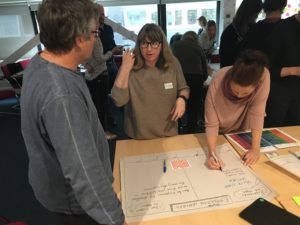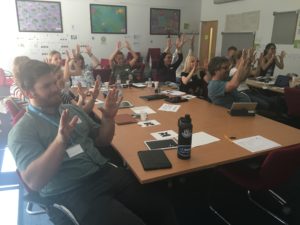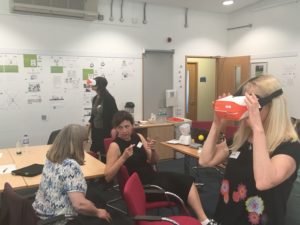Sixteen educators from Denmark, Germany, Austria, and Norway last week attended a five-day
‘Personalised Education with Tablets’ course in which they have learned how to apply Multimedia Advocacy and the Universal Design principles and use tablets in their classrooms to support all learners.
The Multimedia Advocacy approach, developed by Rix Inclusive Research, over many years of research, combines the principles of student-centred practice, universal design for learning and the self-advocacy framework. The course, which was delivered at the University of East London, was developed by Rix together with Austrian organisation ‘atempo‘ over the two-year long Erasmus+ funded research project ‘Inclusive Education with Tablets‘ (IncluEdu). The project saw the Multimedia Advocacy approach combined with and applied to latest developments in mobile technologies to further remove barriers to education for all learners.
On the first day of the course, the educators identified their personal learning goals for the week that they then worked towards over the five days. Most had already used tablets in their teaching and were interested in learning strategies for using them more effectively. For others, using tablets in their classrooms was completely new and they wanted to learn about a few apps and how to apply them in their teaching.

The aim of the course was to introduce everyone to the Multimedia Advocacy Approach to personalised teaching and explore a range of apps to facilitate students’ learning. The programme included visits to a mainstream and a special school, learning in the park, reflections, self-directed study, app demonstrations, presentations, and workshops.

The rapidly changing job market will require graduates to have skills to adapt to the unknown demands of new roles. Educating students is no longer preparing them for the known but for the unknown. The skills that young people must learn are those of creativity, adaptability, critical thinking and learning to learn. The course was delivered with, and therefore modelled for the teachers, the Universal Design for Learning approach, which cultivates and encourages exactly these skills of adaptability and self-directed learning.
The feedback from the teachers attending the course was really positive, with 100% of participants being satisfied with the course. The participants enjoyed all aspects of the course and returned to their respective countries with new ideas and inclusive strategies to apply to their teaching.
Forthcoming ‘Personalised Learning with Tablets’ courses will be delivered in Austria, Finland, Ireland, Germany and Cyprus as well as the UK. If you are an educator from the UK or Europe and would like to attend one of the courses, you can apply for an Erasmus+ mobility grant to cover the cost. Visit the IncluEdu website for information about the courses and how to apply: https://www.incluedu.com/courses-201617/

